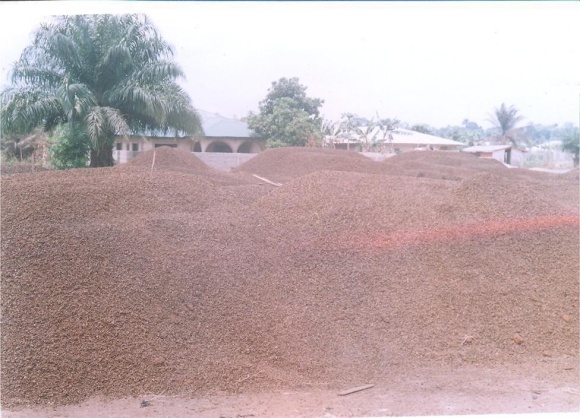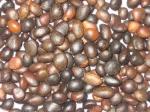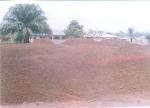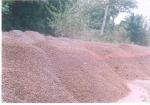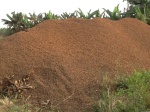Step By Step Process For Making Shea Butter
Shea Butter is a natural cream that is hand made from the nut of the Karite tree in Africa. The process is long and hard, and falls to the women of Africa. Sometimes, the women will have to walk miles and miles to get to where the Karite trees are. They do not pick the fruit from the trees. It must first mature and it falls to the ground, where it is harvested from. The women collect the fruit, and carry it back to where they perform the Shea Butter making process. The fruit is consumed, and the kernels are used to make the Shea Butter. First, the nuts are sorted. Then they are parboiled.
After the boiling, they are left in the sun to dry. They must be completely dehydrated, so this part of the process can take up to a week. When they are completely dry, they are collected again and crushed. The women will either crush them with a mortar and pestle or some other device, causing the nuts and the kernels to be separated.
After this process, the nuts are roasted in a metal sort of pot and put through a grinding process. This makes what looks like a brown paste. The paste is processed a second time in a very arduous procedure. This involves mixing, kneading and adding water.
When this is finished, the resulting butter is creamy and usually thick. It can range in color from beige to light or dark green or even gray. It normally depends on what season the nuts were harvested, how mature they were and other factors as well. This butter is then either sold as a body product in itself or added to other products. This is the natural and unrefined kind of Shea Butter, which has numerous benefits and health promoting properties. The kind that is refined loses virtually all of its healing properties.
Article Source: http://EzineArticles.com/?expert=Dr._Robyn_Tisdale_Scott
PALM KERNEL NUT & SHELL
Product Description: The Oil Palm tree is one of the greatest economic assets a state or nation has, provided its importance is realized and potentials fully harnessed. Oil Palm products include Palm Oil, Palm Kernel Oil, and Palm Kernel Cake amongst other products. These can further be processed into RBD OLEIN (Cooking Oil), Vegetable Ghee, Shortenings, Margarine, CBS. CBE, Ice Cream, Dough, Creaming, Coating, and other specialty fats. Some other by-products of the Oil Palm include Palm wine, fatty alcohols as well as intermediates. Nature so made it that all aspects of the Oil palm tree are useful and economically viable.
“Oils” is a collective term for more or less viscous, generally organic-chemical liquids. Depending on their chemical composition, a distinction may be drawn between fatty, essential, mineral and silicone oils. Fatty oils include liquid, semisolid and solid products of vegetable and animal origin. They are also known as sweet oils.
Palm kernel oil is a white to yellowish oil of vegetable origin which is solid at normal temperatures and is obtained from the kernels of the oil palm (Elaeis guineensis). It is one of the best oils. Palm kernel oil is different from palm oil, which is obtained from the flesh of the fruit. Four {4} products namely palm kernel oil,palm kernel cake,palm kernel sludge and palm kernel shell {crushed} which is used as a biofuel can be gotten from palm kernel nuts.
Palm kernel oil is processed to yield edible fats, soaps and candles and is used in the confectionery, pharmaceutical and perfume industries.
Location, Availability and Production of Palm Kernel Nuts and Oil:
Palm kernel nut is a by-product from the milling of palm oil and can be sourced from oil palm plantation scattered in the rain forest region in southern Nigeria. The nuts can be sourced bit by bit from farmers after extracting the oil from the fruits in villages or from palm oil producing companies. The product is usually available in large quantity during raining season from May to September and extends to December.
It is important at this point to note that in the production of palm kernel nuts, we have the hand and machine cracked. The hand cracked palm kernel nuts are those gotten by the use of hand while the machine cracked is that gotten from the use of machine in the cracking process.
Though buyers usually prefer the hand cracked because the FFA {Free Fatty Acid} content is usually low due to less breakage of the nuts but cannot depend only on it due to less output. Machine cracked with the advantage of more output gives high FFA content which can be controlled by reducing the breakage of nuts. The machine in question has an efficiency of 90%, that is, if 100 KG of palm kernel {unshelled} is feed into the machine, 90% of the palm kernel nut would not be broken.
The machine we used for the production of palm kernel nuts are two types, the ones that can crack and separate the nuts from the shell and the other that does not separate the nuts from the cracked shell.
Below are the pictures of our palm kernel shell
SHEA-BUTTER AND SHEA NUT PROFILES
Product Description:
Shea butter is a slightly yellowish or ivory colored natural fat extracted from the seed of the African SHEA TREE by crushing and boiling. It is widely used in cosmetics as a moisturizer and salve. Shea nuts are primarily grown in West and Central Africa in the semi-arid Sahel, referred to by traders as the “Shea Belt”. Vitellaria paradoxa and Vitellaria nilotica are the two main varieties. Vitellaria paradoxa is exported in the largest volume and grows throughout the West African region. Vitellaria nilotica is produced primarily in northern Uganda and southern Sudan. Shea Nut products, the solid fat (butter or stearin) and the liquid oil (olein), are ideal for use as raw materials in cooking oil, margarine, cosmetics, soap, detergents and candles, but it has found its primary market niche as a substitute for cocoa butter in the chocolate and confectionery industry.
Harvest:
Shea nut trees grow widely and naturally in West Africa. They only begin to bear fruit after about 20 years and do not reach maturity for 45 years. They may continue to produce nuts for up to 200 years after reaching maturity. The nuts, which are embedded in a soft fruit, fall to the ground during the harvesting period (typically June through August). They are then buried in pits which cause the pulp to ferment and disintegrate and produce enough heat to prevent germination. The nuts are dried for a few days and are later shelled and winnowed, usually by hand. The kernels are dried further to reduce moisture content from about 40 percent to about 7 percent.
Locations:
Sheanut grows in the wild across the Sudan-Sahelian region of Africa. The major producing countries are: Nigeria, Togo, Benin, Ghana, Uganda, Mali, Burkina Faso and Central African Republic. Nigeria is currently the leading producer of Shea Nut in the world
Specifications/Grades:
Shea butter is graded based on a number of factors. For some buyers, it could be based on the percentage of the expected vital constituents present in the sample while some other buyers use the level of refining and contamination present as their criteria. Based on the percentage of the expected vital constituents present, Shea butter can be graded as shown in the table below;
Based on the level of refining done and contamination present, shea butter is now classified into five grades:
A. Raw or unrefined, extracted using water
B. Refined
C. Highly refined and extracted with solvents such as hexane
D. Lowest uncontaminated grade
E. With contaminants
Commercial grades are A, B, C. The color of raw (grade A) butter ranges from cream (like whipped butter) to grayish yellow, and it has a nutty aroma which is removed in the other grades. Grade C is pure white. Grade A retains the most natural vitamins, especially vitamin A and vitamin E, which are partially lost in the other grades.
Uses
Traditionally, African Shea Butter is used for cooking oil, as a water proofing wax, for hairdressing and for candle-making; and also as an ingredient of medicinal ointments.
Industrially, Shea Butter is used in cosmetics production, such as moisturizer creams and emulsion, and hair conditioners for dry and brittle hair. It is also used by soap makers, typically in small amounts (5-7% of the oils in the recipe), because of its property of leaving a small amount of oil in the soap. Shea butter is also used as an ingredient in chocolate fillings.
Medicinally, Shea butter is used as a base for medicinal ointments, and has been claimed to have anti-inflammatory properties emollient and humectants. Shea butter has been claimed to be effective treatment for the following conditions: fading scars, eczema, burns, rashes, severely dry skin, dark spots, skin discolorations, chapped lips, stretch marks, wrinkles, and in lessening the irritation of psoriasis.
New Commercial Uses includes:
1. Dry skin
2. Skin rash
3. Skin peeling, after tanning
4. Blemishes and wrinkles
5. Itchy skin
6. Sunburn
7. Shaving cream for a smooth silky shave
8. Small skin wounds
9. Skin cracks
10. Tough or rough skin (on feet)
11. Cold weather
12. Frost bites
13. Stretch mark prevention during pregnancy
14. Insect bites
15. Healthy skin
16. Muscle fatigue, aches and tension
17. Use before and after strenuous exercise
18. Skin allergies such as poison ivy or poison oak
19. Eczema
20. Dermatitis
21. Skin damage from heat (hot grease while cooking, radiation treatment for certain medical problems, etc.)
Other Commercial Uses includes:
A. Shea based adhesives, resins, and composites
B. Shea Plastics and compounding
C. Shea conversion into chemicals, solvents, and fuels
D. Nutritional value and characterization
E. Total utilization of Shea materials for new commercial uses
For more information and bulk purchase
Visit us at
Suite B6, 82 Old Ojo Road,
By Church B/Stop,
Agboju,
Lagos,
Nigeria
or
Email us at melcify@yahoo.com
or
Call +234-803-793-2874
Hello world!
Welcome to Melcify Nigeria Limited, a multidimensional trading and export company based in Lagos, Nigeria that involved in sales and exportation of Shea-Butter, Shea Nut, Palm Kernel Nut, Palm Kernel Shell and Cashew Nut.
MELCIFY Nigeria Limited was incorporated in Lagos, Nigeria on the 24th Day of February, 2012 by the Corporate Affairs Commission of the Federal Republic of Nigeria under the Companies and Allied Matters Act of 1990 with its head office located at Suite B6, 82 Old Ojo Road, Agboju, Lagos.
Telephone Number:+234-803-793-2874
Email Address: info@melcify.com
Office Address: Suite B6, 82 Old Ojo Road, By church B/Stop, Agboju, Lagos.
Happy blogging!

